Tale of an angry mother and beaten rice in Nepal
Beaten rice, or flattened rice, is a raw rice product known as Chura in Nepal. Rice is beaten into flat, light, dry flakes and these flakes absorb the liquids and tastes of the foods served with it. In Nepal it’s mainly eaten as a nutritious snack.
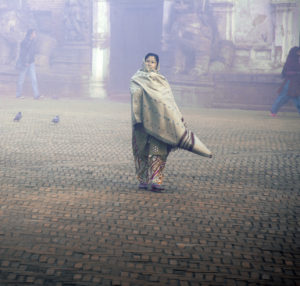
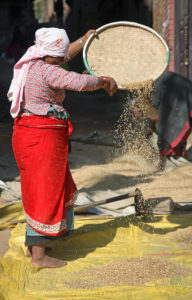
My inspiration for this post about beaten rice comes from all the happy new year wishes I send to my beloved ones in Nepal. According to their calendar, they enter the year 2075. Happy new year to you all!
It brings me back to this story. Whilst living in Chengdu, China, I become good friends with Punya, a student from Nepal studying medicine in Chengdu. He tells me about his home town and the funding problems that Bhaktapur Cancer Hospital faces. At the time I run a small NGO, called Action Where Needed, so I feel action is needed in this case. When I plan a trip to Nepal, Punya insists that I stay with his mother for a few days, while working on the project in the hospital. At first, I politely decline, I don’t want to bother his family and I think I prefer the freedom of a guesthouse. But there is no way around it, as it’s impossible to say no to Nepali hospitality. I accept the invitation with gratitude and plan to stay in his family’s house for 3 days. I end up staying for 3 months.
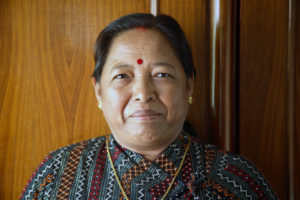
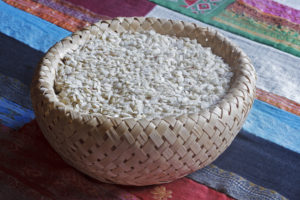
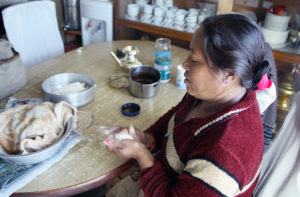
I completely fall in love with Punya’s mother, Punya Shwori, She is strict, I cannot go out in the evening and I can only drink alcohol together with her. I find out about these rules the hard way. One evening I am on my way home around 9 p.m., accompanied by two male friends and oops I did drink some raksi, the locally brewed alcohol. She is outdoors frantically looking for me, and when she approaches me, she slaps me in the face. It makes me feel like a naughty teenager, a feeling I actually quite like. She forgives me, I forgive her, and after that day I always make sure to be home before 7 p.m.
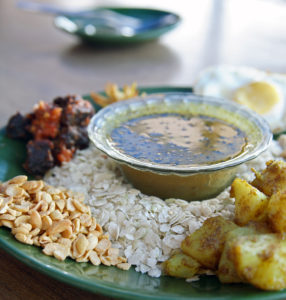
Most of the days, I come home at the end of the afternoon, after a day of work at the hospital or a day of photography in beautiful medieval Bhaktapur. I tell her all about my adventures of the day, and even if she doesn’t speak a word of English, she understands everything. While chatting away, she makes me a nice cup of steaming hot chai, spiced black tea with milk, and a plate of beaten rice. A flattened rice that can be served with anything available in the kitchen. Sometimes as simple as with just some tomatoes, onions and peanuts. Or with leftovers from the dal bath – literally translated as rice with lentils, the staple food of Nepal – of the day before such as lentils, a chicken curry or aloo – a potato dish. In any case you need something juicy, as the beaten rice is dry. I always eat the savoury version, never the sweet version with milk or yoghurt and jaggery, or porridge style.
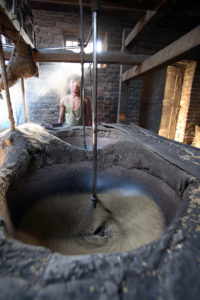
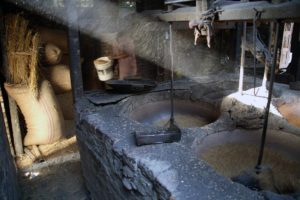
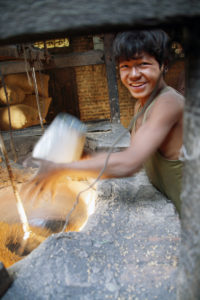
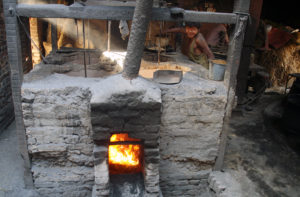
Workshops that produce the chura work over time during the days before the start of one of the many festivals in Bhaktapur, as beaten rice is also eaten as a festive dish and at wedding ceremonies. To make it commercially, the rice is threshed, then soaked, roasted, hulled and polished and finally rolled to make it flat, then sieved and dried. A beautiful process to witness. And the thinner the flake, the more expensive the chura will be.
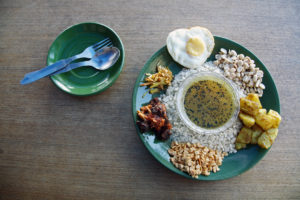
As it is only available in Nepal, India and Bangladesh, I try to figure out how to make it myself. To make it at home, I soak the rice overnight in water, the next day it takes a lot of pounding pounding pounding until it is flattened, then I dry it. I assumed that one grain of rice would make one flake, but a few grains will form a flake. The easy way would be to buy them in an Asian grocery store, the beaten rice from India being the most available worldwide.
